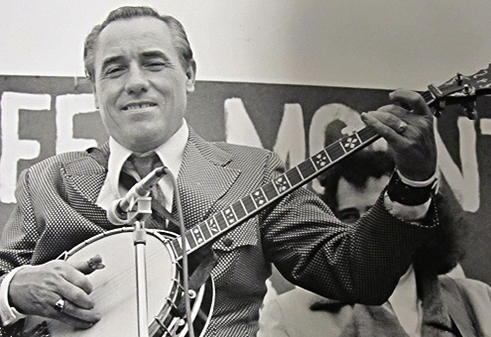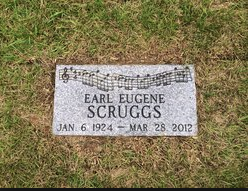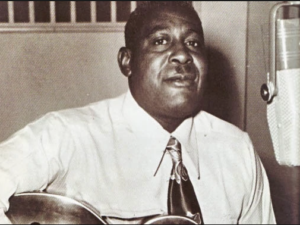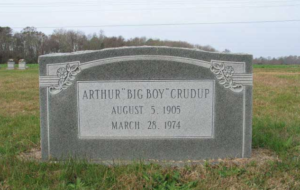Two men who influenced American music died today, Earl Scruggs, who passed on March 28, 2012 at the age of 88, and Arthur “Big Boy” Crudup, who was booked into the big bandstand in the sky in 1974, at 68.
 If you enjoy pretty much any bluegrass music, you should thank Earl Scruggs. His three-fingered style of playing moved the banjo from a rhythm instrument to the lead. First coming to prominence as a
If you enjoy pretty much any bluegrass music, you should thank Earl Scruggs. His three-fingered style of playing moved the banjo from a rhythm instrument to the lead. First coming to prominence as a member of of Bill Monroe and his Blue Grass Boys in 1945, he left that band a year later, taking his longtime musical partner, guitarist Lester Flatt with him. The two became one of the most popular country act; Scruggs’ “Foggy Mountain Breakdown,” establishing itself a one of bluegrass’ most enduring songs, a central to the music as Chuck Berry’s “Johnny B. Good” is to rock and roll.
member of of Bill Monroe and his Blue Grass Boys in 1945, he left that band a year later, taking his longtime musical partner, guitarist Lester Flatt with him. The two became one of the most popular country act; Scruggs’ “Foggy Mountain Breakdown,” establishing itself a one of bluegrass’ most enduring songs, a central to the music as Chuck Berry’s “Johnny B. Good” is to rock and roll.
 A bluesman out of Clarksdale, Mississippi, Arthur Crudup isn’t as well known for his own records, but his keening vocals and easy rolling style put him in the same tradition as Tampa Red or Washboard Sam, musicians who Crudup would share stages with during his career. Recording for Bluebird, Ace, and the Chess subsidiary label Checker, during the 40s and early 50s, he stopped recording in 1954 in protest for his lack of royalties. I realized I was making everybody rich, and here I was poor,” David Szatmary quotes him saying in “Rockin’ in Time.” He worked as a laborer and a bootlegger and performed live around the south. But his profile was raised in 1954, when the first song the young Elvis Presley cut at Sun Records with guitarist Scotty Moore and bassist Bill Black was a cover of Crudup’s “That’s All Right.” Presley went on to cover two other Crudup songs: “My Baby Left Me” and “So Glad You’re Mine.”
A bluesman out of Clarksdale, Mississippi, Arthur Crudup isn’t as well known for his own records, but his keening vocals and easy rolling style put him in the same tradition as Tampa Red or Washboard Sam, musicians who Crudup would share stages with during his career. Recording for Bluebird, Ace, and the Chess subsidiary label Checker, during the 40s and early 50s, he stopped recording in 1954 in protest for his lack of royalties. I realized I was making everybody rich, and here I was poor,” David Szatmary quotes him saying in “Rockin’ in Time.” He worked as a laborer and a bootlegger and performed live around the south. But his profile was raised in 1954, when the first song the young Elvis Presley cut at Sun Records with guitarist Scotty Moore and bassist Bill Black was a cover of Crudup’s “That’s All Right.” Presley went on to cover two other Crudup songs: “My Baby Left Me” and “So Glad You’re Mine.”
Those records brought renewed interest in Crudup; he became known as  “the father of rock and roll,” and was enticed back into the studio in 1968. A deal for back royalties appeared to be worked, but Hill and Range, the publisher that controlled most of the songs recorded by Elvis, balked, and the issues weren’t resolved until after his death.
“the father of rock and roll,” and was enticed back into the studio in 1968. A deal for back royalties appeared to be worked, but Hill and Range, the publisher that controlled most of the songs recorded by Elvis, balked, and the issues weren’t resolved until after his death.

Leave a Reply